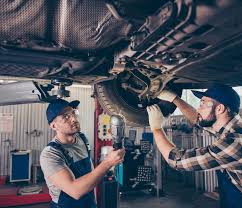
In a recent development, Audax Private Equity’s strategic investment in Dobbs Tire and Auto Centers has sparked conversations about the ever-evolving dynamics in the mid-size automotive aftermarket business. Yogesh P Punjabi, Managing Director at middle market investment bank Capstone Partners, shares valuable insights into the key trends shaping investment activity in this sector.
As the automotive aftermarket landscape undergoes a significant shift, Punjabi highlights a noticeable trend where investors are increasingly favoring non-discretionary services, such as tire retail, general repair, collision, and glass. This preference has resulted in a surge of new platforms being established in highly fragmented subsectors, contrasting the decline in enthusiast-oriented businesses within the aftermarket.
Punjabi emphasizes the recession resistance of non-discretionary parts and services in the aftermarket, attributing it to the industry’s resilience during challenging economic times. The conversation further delves into the factors that make family-owned-and-operated service providers like Dobbs attractive to financial buyers, including industry tailwinds, the shift from DIY (do-it-yourself) to DIFM (do-it-for-me), and proven consolidation success by financial investors.
In the interview, Punjabi shares insights from both recent live engagements—including the Dobbs transaction—and Capstone’s most recent Automotive Aftermarket M&A Update. The interview explores the strategies employed by financial buyers, such as Kian Capital, O2 Investment Partners, and The Sterling Group, in deploying capital and establishing new platforms. Punjabi sheds light on the commonalities among these strategies, including strong regional platforms, proven management organizations, and a focus on potential pipeline acquisitions.
Looking ahead, Punjabi envisions financial buyers intensifying their focus on services sectors, particularly tire retail, general repair, and collision repair. Additionally, he anticipates increased interest in aftermarket wholesale distribution and technology plays across the services spectrum.
The discussion extends to the specific diligence criteria and priorities financial buyers emphasize when evaluating potential targets in the automotive aftermarket. Factors like a strong management team, financial growth, brand reputation, and revenue growth driven by demand play pivotal roles in their decision-making process.
As private equity interest in the sector remains robust into 2024, Punjabi offers valuable advice to middle-market businesses seeking acquisitions. Preparation, transparency in operational and financial data, and strategic planning are highlighted as critical elements, along with the importance of selecting a seasoned M&A advisor early in the process.
This Automotive Industries interview with Yogesh provides a comprehensive overview of the current state of the automotive aftermarket, offering valuable insights for businesses, investors, and industry enthusiasts navigating this transformative landscape.
Automotive Industries: Yogesh, given the recent Audax Private Equity’s growth investment in Dobbs Tire and Auto Centers, can you share insights on the key trends that Capstone Partners has identified driving investment activity in the mid-size automotive aftermarket businesses?
Punjabi: Investors are strongly favoring the non-discretionary side of the automotive aftermarket, especially across services (tire retail, general repair, collision, glass, etc.). There have been proven PE-backed platforms in this space for many years, but there is an increased focus on establishing new platforms in highly fragmented subsectors.
This shift has largely occurred at the expense of aftermarket enthusiast-oriented businesses, similar to the dynamic across other enthusiast sectors.
The aftermarket is recession-resistant – especially the non-discretionary parts and services sub-segments of the aftermarket.
Automotive Industries: With private equity platform investment activity having faced challenges in 2023, what factors have made the automotive aftermarket sector, especially family-owned-and-operated service providers like Dobbs, attractive to financial buyers?
Punjabi: There are several factors at work here:
- Compelling underlying industry tailwinds in the aftermarket. For example, average vehicle age is older, miles driven are up, and the number of vehicles on the road is higher. These sector fundamentals lay a strong foundation for continued growth.
- An ongoing shift from DIY (do-it-yourself) to DIFM (do-it-for-me) in the parts and services space.
- Highly fragmented and large addressable markets across service subsectors.
- Proven consolidation success by financial investors (i.e., Mavis, Sun Auto, etc.) with significant runway remaining for further consolidation.
- An attractive financial profile and potential investment returns through greenfield, brownfield, and M&A.
- A scarcity of high-quality, independently owned platforms of scale with regional market density and longstanding brand/reputation.
- The recession resiliency of the non-discretionary automotive aftermarket.
Automotive Industries: Capstone Partners mentioned that financial buyers accounted for nearly half of the annual sector deal volume through Q3 2023. Could you elaborate on the strategies employed by these financial buyers, such as Kian Capital, O2 Investment Partners, and The Sterling Group, in deploying capital and establishing new platforms in the automotive aftermarket?
Punjabi: These are privately held investments, so we cannot elaborate much given the confidential nature of discussions. However, at a high level, they all have in common a strong regional or multi-regional platform investment with attractive scale, proven management organization (either centralized or de-centralized), a large potential pipeline of add-on acquisitions, and well-capitalized institutional ownership.
Further, most of these businesses are comprised of independent brands, while Kian’s platform especially is comprised of a large franchisee in the Meineke system.
Automotive Industries: In light of the recent establishment of platforms like PARC Auto by Kian Capital, Straightaway Tire & Auto by O2 Investment Partners, and Premier Tire & Service by The Sterling Group, what do you see as the driving forces behind the creation of these new platforms, and how do they contribute to the overall M&A landscape in the automotive aftermarket?
Punjabi: The driving forces behind these platforms are similar to those mentioned above, which apply broadly to the automotive aftermarket non-discretionary services sectors.
Automotive Industries: Given the projections for robust activity in the sector throughout 2024, how does Capstone Partners foresee the role of financial buyers evolving, and what specific opportunities do you anticipate for mid-size businesses in the automotive aftermarket space?
Punjabi: We believe that financial buyers will become even more focused on the services sectors of the aftermarket, namely tire retail, general repair, and collision repair. We also believe that there will be increased interest in the aftermarket wholesale distribution segment, along with technology plays across the services spectrum (i.e., diagnostics, ADAS calibration, fleet maintenance, etc.).
Automotive Industries: Jason Ellis from Audax PE highlighted Dobbs’ attractiveness due to the quality of its operations, strong customer loyalty, and employees. Can you shed light on how these factors played a role in identifying Dobbs as an attractive platform and how they align with Capstone Partners’ overall investment thesis in the auto services sector?
Punjabi: Audax’s investment thesis revolves around most if not all of the factors I mentioned earlier.
We ran a highly competitive transaction process for Dobbs Tire in 2023, and given Audax’s well-defined investment thesis in the space, coupled with their proven success and experience across the various aftermarket sectors, they ended up partnering with the Dobbs family to accelerate the growth of the business.
Automotive Industries: As private equity buyer activity remains robust in 2024, could you elaborate on the specific diligence criteria and priorities that these buyers are focusing on when evaluating potential targets in the automotive aftermarket?
Punjabi: The criteria investors are currently prioritizing include:
- A strong management team supported by growth-minded employees.
- A proven history of financial growth and profitability.
- Attractive operating metrics compared to industry players.
- Strong brand reputation (regionally or broadly) with a loyal/repeat customer base.
- Revenue growth driven by sales volume (demand) in addition to price increases.
- A long runway of potential add-on opportunities.
Automotive Industries: In the context of inflationary pressures easing and acquirers prioritizing companies with demonstrated unit growth and healthy demand, what advice would Capstone Partners offer to middle-market businesses in the automotive aftermarket seeking to position themselves attractively for potential acquisitions by private equity buyers?
Punjabi: My strongest piece of advice is to start preparing your business early–ensure that operational data and financial books are in order (either reviewed or audited financials), legal documents like contracts, incorporation documents, etc. are assembled, you have filled out your management team to the extent possible, and that you have a solid plan for key employee retention post-transaction. In addition, have a view on growth opportunities—under current ownership as well as potential for the next owner or investor—start discussions (if possible) with potential add-on business owners, continue to focus on growing the business, and don’t hesitate to proceed with major capex projects. In essence, do what is best to position the business for current and sustained growth.
Finally, select a strong M&A advisor with proven experience in your sector—the earlier this is done, the better—to ensure that your business is prepared for an M&A event and can withstand the meaningful diligence process of a financial investor. The groundwork for a successful transaction is often laid years in advance, and having an expert on side to guide you through the process can make a world of difference.












More Stories
How to Create the Ultimate Off-Road Vehicle Garage: A Practical Guide
How Diesel Pickups Are Outperforming Gas Trucks on Tough Jobs
Essential Steps To Help Your Vehicle Retain Value